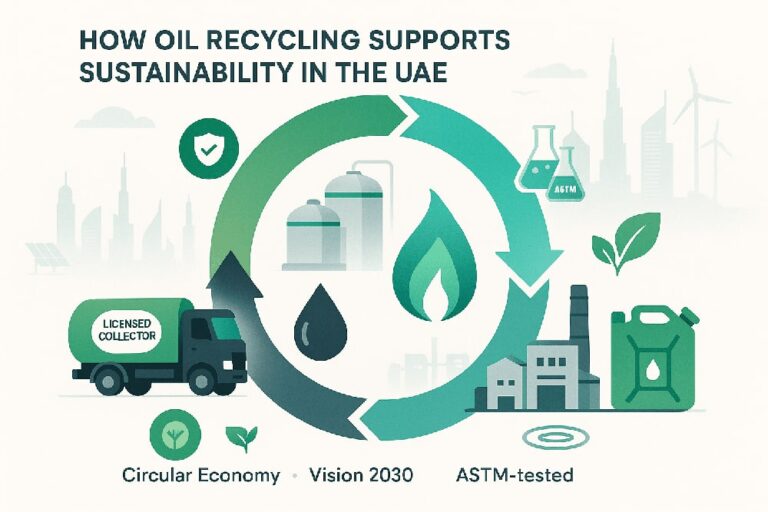The UAE is moving rapidly toward a sustainable, low-waste economy. While renewable energy often takes the spotlight, oil recycling quietly plays a crucial role in this transformation. By converting used lubricants and industrial waste oils into reusable fuels, companies like Safeenat Al Sharq are helping the nation reduce waste and protect its environment.
This article explores how oil recycling supports sustainability in the UAE and why it’s an essential part of modern industrial operations.
1. The Growing Challenge of Used Oil Waste
Every year, thousands of tons of used lubricants are generated by factories, power plants, and vehicles across the UAE.
If not handled properly, this waste can contaminate soil and water. A single liter of oil can pollute up to one million liters of water.
That’s why proper collection and recycling are critical for both environmental safety and regulatory compliance.
Fact:
Used oil is considered hazardous waste under UAE law and must be managed by licensed collectors such as Safeenat Al Sharq.
2. Turning Waste into Resource
Oil recycling involves collecting, filtering, and reprocessing used oils into usable products like industrial fuel, furnace oil, or re-refined base oil.
This process minimizes waste while creating economic value from what would otherwise be discarded material.
Benefits:
Reduces demand for virgin crude oil.
Cuts industrial energy costs.
Lowers carbon emissions.
Supports UAE’s Circular Economy Policy.
3. Supporting UAE Vision 2030 for Sustainability
The UAE Vision 2030 emphasizes environmental protection, resource efficiency, and circular economy principles.
Oil recycling fits perfectly within this framework, helping the country meet sustainability and carbon reduction targets.
Why It Matters:
Encourages responsible industrial behavior.
Strengthens local recycling industries.
Reduces landfill pressure and environmental risk.
4. Safeenat Al Sharq’s Role in a Greener Future
Since 2002, Safeenat Al Sharq has been at the forefront of used oil collection and recycling in Sharjah and across the UAE.
With modern laboratory facilities, storage tanks, and a dedicated fleet, the company ensures every drop of collected oil is handled safely and reprocessed responsibly.
Company Strengths:
Licensed and compliant operations.
On-site quality testing (ASTM standards).
Flexible collection and fuel supply services.
Certified recycling for environmental assurance.
5. The Future of Oil Recycling in UAE
The next step in oil recycling will involve advanced re-refining technologies capable of producing high-grade base oils — nearly identical in quality to new lubricants.
As sustainability regulations tighten and industries focus on ESG (Environmental, Social, Governance) goals, oil recycling will become an essential part of every industrial operation.
What’s Next:
Broader adoption of re-refined oils in industrial supply chains.
Expansion of recycling infrastructure in UAE free zones.
Enhanced public awareness and compliance enforcement.
Oil recycling isn’t just an environmental initiative, it’s a strategic industrial practice that saves costs, supports compliance, and builds a cleaner future.
By partnering with Safeenat Al Sharq, UAE industries can meet their sustainability goals while ensuring safe and efficient oil management.



